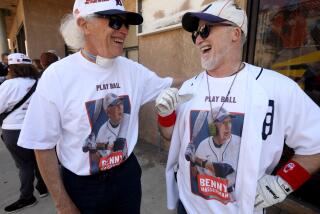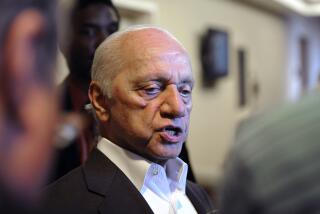Richard Knerr, 82; co-founded Wham-O, maker of the Hula Hoop and Frisbee
Richard Knerr, co-founder of Wham-O Inc., which unleashed the granddaddy of American fads, the Hula Hoop, on the world half a century ago along with another enduring leisure icon, the Frisbee, has died. He was 82.
Knerr died Monday at Methodist Hospital in Arcadia after suffering a stroke earlier in the day at his Arcadia home, said his wife, Dorothy.
With his boyhood best friend, Arthur “Spud” Melin, Knerr started the company in 1948 in Pasadena. They named the enterprise Wham-O for the sound that their first product, a slingshot, made when it hit its target.
A treasure chest of dozens of toys followed that often bore playful names: Superball, so bouncy it seemed to defy gravity; Slip ‘N Slide and its giggle-inducing cousin the Water Wiggle; and Silly String, which was much harder to get out of hair than advertised.
When a friend told Knerr and Melin about a bamboo ring used for exercise in Australia, they devised their own version without seeing the original.
They ran an early test of the product in 1958 at a Pasadena elementary school and enticed their test subjects by telling them they could keep the hoops if they mastered them.
They seeded the market, giving hoops away in neighborhoods to create a buzz and required Wham-O executives to take hoops with them on planes so people would ask about them.
Wham-O soon was producing 20,000 hoops a day at plants in at least seven countries, while other companies made knockoffs. Within four months, 25 million of the hoops had been sold, according to Wham-O.
In the 1985 book “American Fads,” Richard A. Johnson wrote that “no sensation has ever swept the country like the Hula Hoop.”
The craze also provided a significant business lesson.
“In April of 1958, people were standing around the block at department stores that were waiting to get their shipment,” Knerr’s son, Chuck, told The Times. “By September, you couldn’t give them away. Once every household had two or three, it was over because they lasted forever.”
Wham-O toys often had an air of originality that Knerr called the “wow” factor. He defined it as the moment when “you’re . . . showing it off and everybody says, ‘What’s that? What’s that?’ ”
The company founders experienced their own “wow” moment when former Air Force pilot Fred Morrison was spotted at the beach playing with his invention, the Pluto Platter. They bought the rights, modified it and renamed it Frisbee before releasing it in 1958.
The name may have come from a comic strip called “Mr. Frisbie” or from the Frisbie Pie Co. tins that reportedly inspired the disk’s invention. Both versions of the story have been attributed to Knerr.
Initially, Frisbees were marketed by word of mouth on college campuses, and more than 100 million were sold in 30 years. A professional model went on sale in the 1960s, and the team sport known as Ultimate Frisbee soon was played on college campuses. Frisbee Dog World Championships have been held since 1975.
“We didn’t want it used as a toy,” Melin told the Pasadena Star-News in 1998. “We wanted it to be a sport.”
Tom Wehrli, who has a canine Frisbee museum in his Chicago basement, called the company’s story “pure Americana.”
“Wham-O sold about 230 different items. Our grandparents, guaranteed, touched a Wham-O product,” Wehrli told The Times.
In 1982, the founders sold the company for $12 million to Kransco Group Cos. Mattel Inc. bought Wham-O in 1994 and resold it to a group of investors in 1997.
Richard Knerr was born June 30, 1925, in San Gabriel.
As a teenager, he met his future business partner, Melin, and the two remained lifelong friends. They went to USC together, and Knerr earned a bachelor’s degree in business in the late 1940s.
Neither wanted to work for their fathers -- Knerr’s sold commercial real estate and Melin’s was in the lumber business.
The duo started a business training falcons. To teach the birds to dive at prey, they lobbed meatballs with a homemade slingshot.
“I don’t want a bird, one prospective customer said, but I’d sure like a slingshot like that,” Knerr said in Fortune Small Business magazine in 2003.
So they bought a band saw and made slingshots in the Pasadena garage of Knerr’s parents. They also sold other novelty hunting tools such as boomerangs and crossbows.
Within a few years, they were making about $100,000 a year and moved their company to a building in San Gabriel.
At Wham-O, the duo -- when they weren’t taking bets on who could bounce the Superball into the wastebasket -- remained wildly open to ideas.
“You can’t tell whether the fish will bite if you don’t drop a line in the water,” Knerr was fond of saying.
The approach could result in flops, such as the do-it-yourself fallout shelter, marketed at the height of the Cold War for $119, or the kit with plastic great white shark teeth that came out when the movie “Jaws” did in 1975.
“He and his partner, and everyone they worked with . . . were like the Rat Pack and characters from ‘MASH,’ with oversized personalities,” Chuck Knerr said. “If it wasn’t about fun, he wasn’t interested.”
Knerr, who was known to linger in toy stores, told The Times in 1994: “If Spud and I had to say what we contributed, it was fun. But I think this country gave us more than we gave it. It gave us the opportunity to do it.”
Melin died in 2002.
In addition to his wife, Dorothy, whom he married in 1979, Knerr’s survivors include his three children from a first marriage that ended in divorce, Melody Knerr, Chuck Knerr and Lori Gregory; two stepchildren, Richard Enright and Jeanne Stokes; and eight grandchildren.
Services will be private.
Instead of flowers, the family suggests donating to the Braille Institute Auxiliary of Pasadena Tribute Fund, 615 S. Madison Ave., Pasadena, CA 91106 or to the American Heart Assn., www.americanheart.org.
More to Read
Start your day right
Sign up for Essential California for the L.A. Times biggest news, features and recommendations in your inbox six days a week.
You may occasionally receive promotional content from the Los Angeles Times.







